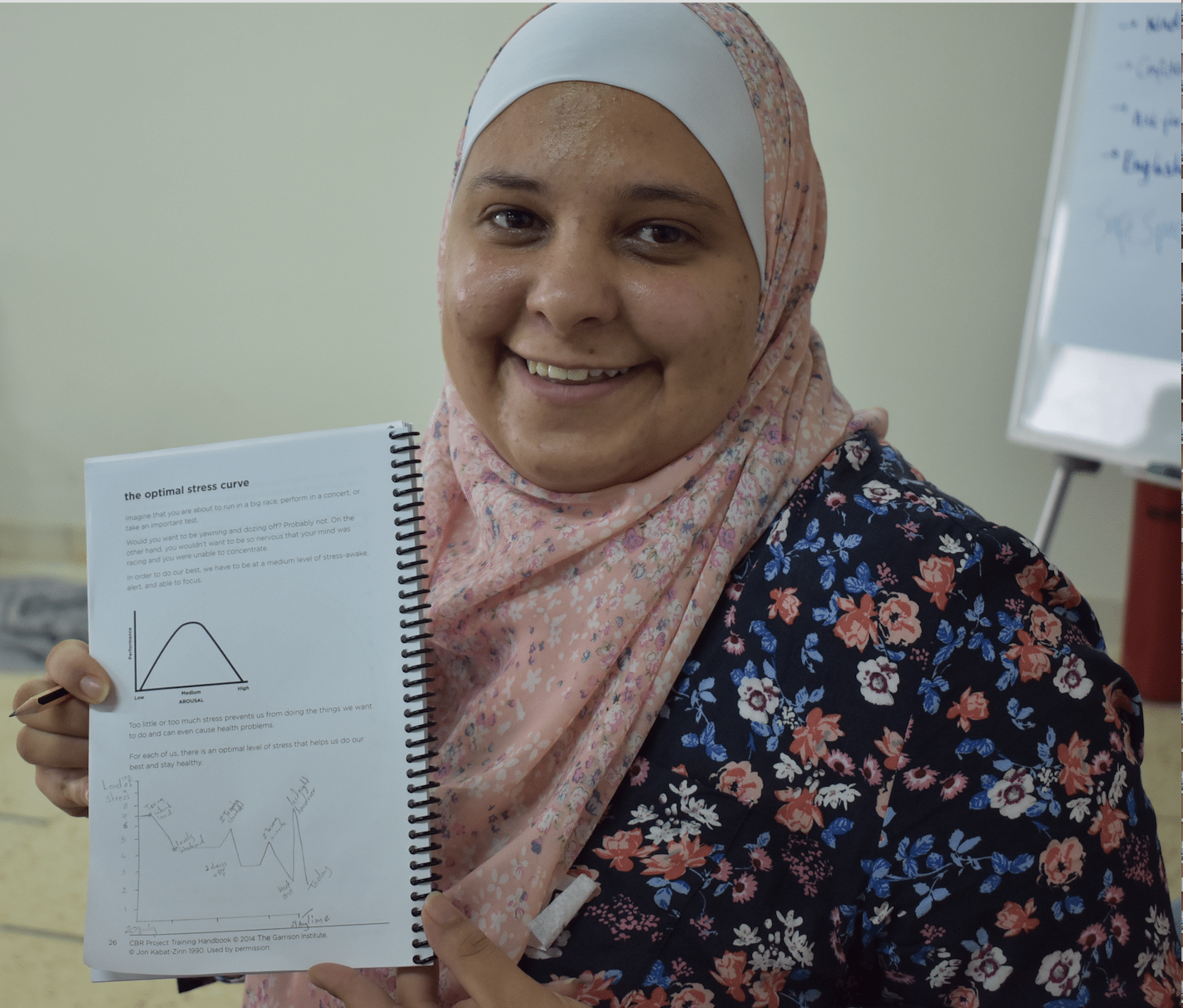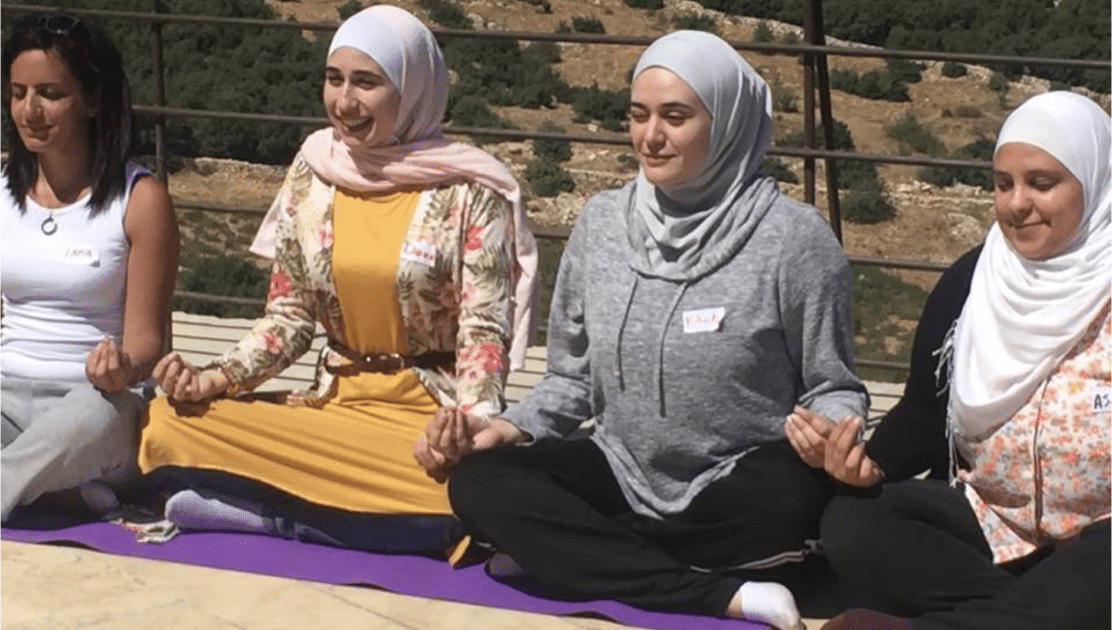Syria Crisis: Mindfulness and Stress Management for Emergency Relief Workers
Two Weeks To Go, More Than Three Years in the Making
By Emmett FitzgeraldFinal preparations are being made by the Contemplative-Based Resilience (CBR) Project team for our biggest operational moment of 2018 so far. From March 20th to March 29th, the CBR Project’s team of psychologists and meditation and mindful movement teachers will be on the ground in the Middle East offering direct support and building the resiliency skills of aid workers in offices and refugee camps.
Participants were drawn from over 100 available places across the region. We’re looking forward to offering assistance with stress management to people working in Syria, Jordan, Iraq, Gaza, Turkey, and beyond.
So much needs to be done to successfully respond to the huge needs of today’s extraordinary refugee populations that aid workers are called upon to fill a variety of different roles. As a result, the aid workers who will participate in our training will range from leaders managing hundreds of staff and multi-million dollar budgets, to logisticians, finance officers, HR managers, and other key staff working in hectic, pressurized head offices. We will also welcome their colleagues who work right on the front line of the Syria crisis–those delivering life-saving services every day in refugee camps. No matter what job aid workers have, our programs have shown time and time again that aid workers suffer from the same stresses, worries, and emotional fatigue.
The CBR Project training programs help create a safe space for listening and learning so that colleagues can share openly how they are coping. We offer them access to the latest innovations in staff wellness, taken from the private sector and adapted specifically to their needs and the Middle East context. The managers and staff who attend all share the goal of our program–to create higher standards of care for refugees by ensuring that we look after those who care for them.
New Types of Programs and Workshops
After working closely with aid workers over the last few years, we now have a wide range of programs, workshops, and online resources available to CBR participants this month. The content of our training relies on fifteen years of curriculum design and development by the Garrison Institute. Over the last three years, we’ve evolved the curriculum and tailored the program to specifically meet the needs of the aid workers with whom we work. This evolution has been two-fold: a shift in geographical focus and significant diversification of our product offerings.
First, we have shifted our operational focus from the United States to the Middle East–responding to the community of aid workers who told us, “you need to come where the work is.” So we moved our work from New York to Amman, Jordan to meet the needs of those who work with the millions of refugees who have arrived from Syria and elsewhere.
We then adapted our trainings and curriculum based on feedback from aid workers. Using our flagship four-day training program as a starting point, we developed a range of ways for aid workers to receive support, based on their budget and time constraints. So, our CBR Project team will now be running three types of stress management and resilience programs in March:
- A 12-Month program of support which is run by faculty on a monthly basis through webinars, which begins with a Four-Day Training Program. Focusing on practical tools for stress management and resilience, the four-day (three-night) residential retreat will take place at Ma’in Hot Springs near the Dead Sea from March 26th to 29th. (For more information and to register, click here)
- One-Day Workshop in Amman on March 21st is for those who cannot be part of our longer program. In this workshop, we will focus on introducing quick, simple, practical skills to use at home, in the office, or at the camp which ask aid workers to take a couple of minutes to help themselves achieve more focus, cultivate equanimity, and make better decisions by practicing mindfulness and using various breathing and stretching techniques. (For more information and to sign up click here)
- We are also offering 60-90 minute ‘in-house’ stress management introduction sessions, which we run in both aid agency offices and for staff in refugee camps. With these sessions, we bring our programs directly into busy working environments in order to give as many people as possible access to stress management support in a short time-frame. (These sessions are free of charge, and agencies should contact me for details.
In all our programs, led by experienced psychologists, we deliberately open up conversations between colleagues and management about stress and the stigma that surrounds issues like stress and burnout. We also offer an introduction to tools like mindfulness and simple two-minute stretching and breathing exercises which have been shown to offer greater calm and clarity of thought in times of heightened stress.
If you’d like to attend any of these programs, please click here:
Building on Success in 2017
Our 2018 Programs–which will include more Jordan-based training programs and workshops in October and November–all build on the operational, strategic, and advocacy successes of 2017:
- Training Operations in the Field: 2017 saw a three-fold increase in the number of aid workers trained in the previous year because we consolidated the CBR Project’s presence on the ground in the Middle East. Most importantly, the aid workers who attended our trainings consistently reported our curriculum was effective and noted the quality of our faculty and program delivery.
- Strategic Development: In 2017, we were able to forge relationships with various agencies who agreed to send large cohorts of staff to CBR trainings. Based on positive feedback from their staff, multiple agencies have initiated discussions about creating bespoke internal stress-management programming, allowing us to widen our reach in 2018. Central to this success has been the design and delivery of shorter, less expensive workshops and trainings while still retaining the integrity of the original CBR curriculum and approach.
- Advocacy: The CBR Project has amplified the voices of aid workers by creating facilitated peer groups and gathering testimonials and quantitative data measuring the effectiveness of the training programs. By harnessing these testimonials and growing evidence of the success of our programs, I have been able to share our findings with colleagues at international conferences and industry gatherings and talk about the effectiveness of our methodology. It is essential for our long-term success to amplify our participants’ views and values, and advocate for policy changes to shift the industry’s attitudes and practices around aid worker wellness.

Aseel Qudah works in Azraq Refugee Camp in the Jordanian desert, home to 90,000 refugees.
Testimonials
This article in the Stanford Social Innovation Review particularly helped us to explain our work to a wider audience of influencers. But it is feedback from our participants which is particularly satisfying to receive:
“I really think the isolating/lonely aspects of this line of work are the most difficult and draining parts for me. The most significant thing I learned from this training is how much I missed and needed a sense of community and connection”.
“In our office, we agreed that the CBR training was the best week of the whole of 2017.”
“Thank you for letting me get rid of tiredness and stress just in ten minutes. I am glad to have meditation as a habit.”
Fundraising for Scholarships
We are raising funds over the next two weeks for scholarships for our programs. Our goal is to offer between one-third and one-half of all our places to national staff whose personal capacity to pay for our training is limited, and whose agencies do not currently have sufficient funding to offer their staff this kind of opportunity for self-care.
Please consider supporting an aid worker’s health and welfare–you can have a direct affect on improving the lives of thousands of refugees with whom they work.
- For $125 US Dollars, you can provide a scholarship for an aid worker to attend a One-Day Workshop.
- For $1,200 US Dollars, you can provide a scholarship for one aid worker to receive One-Year of support, beginning with the Four-Day residential training program, and continuing through an entire year of webinars, community events, discussion groups and skills training.
If you would like to learn more about our programs, join one of our March training programs, or become part of our community by support us, please visit our website.
Taking the Next Big Steps
In 2018, we will focus on our new initiative to train new CBR faculty from the region. This initiative, which also begins with the training this month, will help us reduce costs and offer more programs. It’s an important step to reach one of our goals for 2019–to offer CBR training programs in Arabic. Over the next two years, we will continue to evolve–listening to the needs of aid workers–and responding to the reality of their working lives.
Emmett Fitzgerald is the Director of the Garrison Institute’s Contemplative-Based Resilience Project. He has been an emergency response aid worker since 2005, working for several years in Haiti, DR Congo, and Nepal. He suffered burnout, depression, and other psychological fallout during his time in the field, and came to the CBR Project first as a participant. He took over leadership of the program in late 2015, and now lives in New York, travelling regularly to the Middle East.
